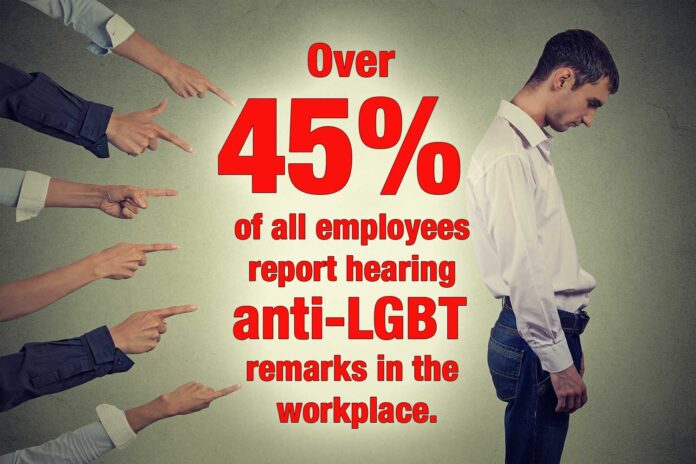A new study from the Williams Institute details how widespread discrimination against LGBTQ people is across all sectors of society.
The study found employees in all sectors, both public and private, report high levels of continuing discrimination and harassment of LGBTQ employees in the workplace. In addition, the report found similar rates of extensive and continuing unfair treatment of LGBTQ people in schools, by law enforcement and by health care providers.
Nearly half (45%) of all employees witnessed anti-LGBT harassment and nearly nine in 10 adult students (87%) report hearing anti-LGBT remarks in school.
The Williams Institute is a public policy research institute based at the UCLA School of Law focused on sexual orientation and gender identities issues. Their ongoing studies, particularly in the areas of discrimination, poverty and violence against LGBTQ have propelled state and local governments to evaluate discrimination on a myriad of levels.
In the latest study, the Williams Institute reveals that significant proportions of both LGBTQ and non-LGBTQ people believe that LGBTQ people are treated worse than non-LGBTQ people at work and at school, as well as by law enforcement and healthcare providers. But equally significantly, the study found that across these domains, one-fourth to over one-third of non-LGBT people responded that they did not know whether LGBTQ people are being treated worse.
This glaring discrepancy signals a long-term problem in enacting anti-discrimination policies: non-LGBTQ people remain largely unaware of the breadth of discrimination against LGBTQ people.
Williams Institute noted in their 20 page report that several studies have measured discrimination against LGBTQ people and public perceptions of discrimination against LGBTQ people. But this study “considers differences in perceptions of discrimination among public sector employees — including federal, state, and local employees — and private sector employees.” Additionally, it examines “differences in attitudes toward non-discrimination protections and other rights among all Americans and among employees in the public and private sectors.”
The study analyzed data collected from 2,237 adults in the U.S. in May and June of 2019. The data were collected by IPSOS in collaboration with Thomson Reuters and the Williams Institute.
Patterns of discrimination reported by state, local and federal government employees, as well as private-sector employees, were found to be very similar: employees in all sectors report high levels of continuing discrimination and harassment of LGBTQ employees in the workplace. In addition, they report similar rates of extensive and continuing unfair treatment of LGBTQ people in schools, by law enforcement, and by health care providers.
But the differences in perception were marked: On the job, 53% of LGBT people reported discrimination versus only 23% of non-LGBT people. At school the difference was equally skewed, with 57% of LGBT people perceiving discrimination compared with only 33% of non-LGBT people.
LGBT people viewed law enforcement as discriminatory 46% of the time while only 24% of non-LGBT people reported that perception. The percent who feel that LGBT people are treated worse than non-LGBT people by healthcare providers was 33% among LGBT people and 16% among non-LGBT people.
Additional key findings of the study included that LGBT adults work in both private and public sectors and that across sectors 5.9% of employees are LGBT. Over 45% of all employees (both LGBT and non-LGBT) report hearing anti-LGBT remarks in the workplace across employer types. Employees in all sectors report that LGBT people are treated unfairly in the workplace nationally; almost one in four (24%) of all employees.
Significant also was how many non-LGBT people were aware of discrimination in various settings. While only 1% of LGBT people reported being unaware of anti-LGBT discrimination in the workplace, 26% of non-LGBT people said they don’t know whether LGBT people are being treated worse. Nearly a third, 32%, of non-LGBT people were unsure whether LGBT people were treated worse at school.
The Williams study also cited these disturbing details: “Over 45% of employees report hearing anti-LGBT remarks in the workplace across employer types. Although the differences are not statistically significant, almost 40% of LGBT employees report hearing such remarks frequently, often, or sometimes (39.3%), compared with one in four (25.5%) non-LGBT employees.”
The study also noted, “Although not statistically significant, those who report hearing such remarks frequently, often, or sometimes range from 21.9% of local employees, to 29.4% of federal employees, and 31.4% of state government and private sector employees.”
The frequency with which LGBT people reported hearing anti-LGBT comments in the actual workplace points to how much aggression toward LGBT people still exists currently, despite many inroads into tolerance for and acceptance of LGBT in most arenas of society.
Another detail from the study suggests that change is not coming swiftly enough for LGBT workers. When asked whether LGBT people experience unfair treatment in workplaces throughout the country — rather than in just the area where respondents live — 24.3% of employees across sectors say that LGBT people are treated worse on the job than people who were not LGBT. However, LGBT employees (52.9%) were twice as likely to feel that LGBT people are treated worse across the nation than non-LGBT employees (22.5%). One in four non-LGBT employees say they don’t know the answer to the question (25.8%) compared with only 0.5% of LGBT employees.
The Williams Institute report, replete with graphs and complete breakdown of the individual elements of the questions can be read at https://williamsinstitute.law.ucla.edu/.

